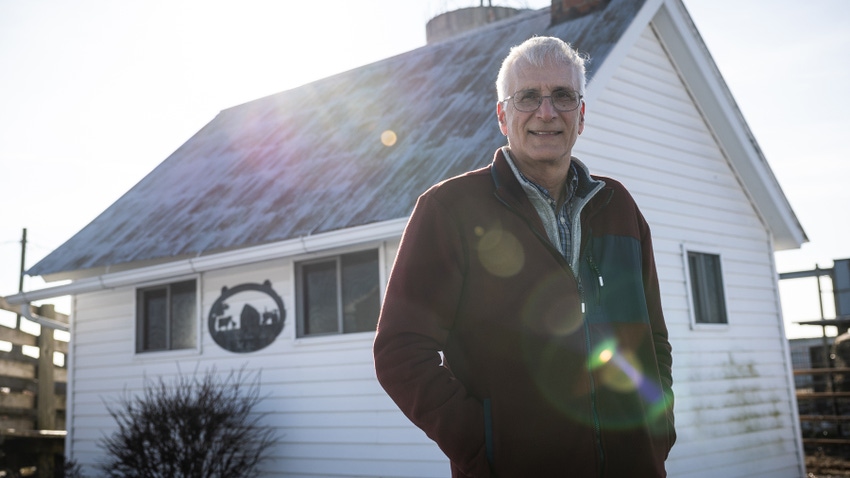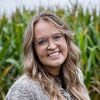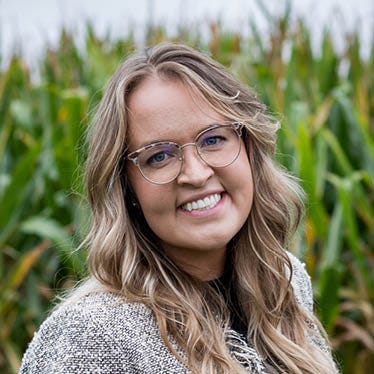March 2, 2023

In the late 1970s, Ron Moore of Roseville, Ill., had his farming epiphany. As a teenager, he helped his father tile a hillside on their farm. Years later, after returning home from college, he noticed the tile outlet wasn’t working. The filter strip had captured silt coming off the hillside, depositing it 3 feet above the tile.
“That was my aha moment that we needed do something different besides moldboard plow everything,” Ron says. “We have to manage those fragile acres so they won’t continue to erode. If we keep the nutrients in the soil where they belong, it improves our yields.”
The revelation would forever change his view on soil management as Ron transitioned to conservation tillage and later to mostly no-till acres.
Ron’s wife, Deb, describes him as careful and strategic about implementing new ideas around the farm to ensure the land is improved for future generations.
The couple met in their college years, and although Deb is from the Chicago suburbs, she was quick to learn the ropes. Soon she was keeping the farm books and working alongside Ron. But it wasn’t always easy to learn on an ever-changing farm.
“I asked Ron if he could just do the same thing next year so I could get an idea of what I was doing,” Deb says, laughing as she recalls her first years keeping the farm’s books. “I learned quickly that never happens. Ron was always making changes and improving things around the farm.”
That careful planning and ingenuity helped make Ron a 2023 Prairie Farmer Master Farmer.

FAMILY: Ron Moore’s favorite part about farming is working with family — first with his father, then with brothers, and now with wife Deb and their son Michael.
Today the Moore Family Farm consists of about 1,600 acres of corn and soybeans, 200 acres of pasture, 150 feeder calves, and 10 acres of hay. Ron has worked hard to grow both his crop acres and cattle herd since coming back to the farm in 1977.
Ron’s favorite part about farming is working with family — first with his father, then with his brothers, and now with Deb and their son Michael.
Michael came home to farm in 2014 after graduating from Illinois State University and working off the farm for three years. He’s been instrumental in the farm’s adoption of precision ag technologies.
“Ron was thrilled having a son come back and farm,” Deb says. “It’s a relief to know the farm is going to stay in the family.”
The farm evolves
Ron says if he could talk to anybody, dead or alive, it would be his father because of how much farming progressed in his lifetime.
“He started farming when you had to shuck corn by hand,” Ron says. “When he retired, we ran a six-row combine.”
But the farm’s evolution is far from over. Ron explains how average crop yields have nearly doubled since he started farming and technological advancements have resulted in better stewardship of the soil.
“The public doesn’t know how much better we farm than we did decades ago,” Ron says. “We’ve made significant strides in herbicide technology, genetics and tillage to better manage our resources.”

NEXT GENERATION: Ron Moore’s son Michael came home to farm in 2014 and has been instrumental in the farm’s adoption of precision ag technologies. “Ron was thrilled having a son come back and farm. It’s a relief to know that the farm is going to stay in the family,” says wife Deb.
Shortly after Ron returned to the farm, the 1980s farm crisis hit. He credits diversification with crops and livestock for keeping the farm solvent through tough times.
Fast-forward nearly four decades later, and the farm economy again was faced with challenging markets — only this time, Michael was in the driver’s seat.
“I need a T-shirt that says, ‘I survived the ’80s,’” Ron says, comparing his start in farming to Michael’s start during the 2017 market downturn and tariff war. “I made a comment in Washington, D.C., that my son would need a T-shirt if he survived the teens.”
It was during this time that John Lumpe, Illinois Soybean Association CEO and Ron’s nominator, says Ron really made Illinois proud.
“Ron should be most remembered for his commitment to the soybean industry in 2018, when the China tariffs hit,” Lumpe says. “He was ASA president that year and was a constant spokesperson for farmers on that issue. He represented farmers across the country well in advocating for ‘trade, not tariffs,’”
Getting involved
Ron’s family instilled the value of community involvement in him at an early age.
“One of the things my father told me when I started farming was the value of giving back,” Ron recalls. “There was always somebody serving to make the community a better place when I was kid. So I’ve tried to remember to pay it forward through my volunteer career.”
Ron’s service includes work with his church, local school and county, as well as his most recent position as president and chairman of the American Soybean Association.
“Ron Moore has provided clear vision and steady leadership for America’s soybean farmers,” says Stephen Censky, ASA CEO. “He has been a worker, servant-leader and mentor in the U.S. soybean industry, and helped transform it to become the domestic and international success that it is today.”
Ron says one of the highlights of his volunteer service was on the ASA board when he met the secretary general of the United Nations. “I thought I would walk into a room with 100 or so people, but instead there were about 15 of us — four farmers and some other industry folks,” he says. “The secretary general was asking us how to help the small holders across the world achieve higher productivity and greater food security.”
And while he’s met high-profile folks along the way, he’s also made the best of friends by serving in ag organizations.
“I’ve tried to make whatever group I was involved with a better organization to represent rural Illinois,” Ron says. “I want to be known as a good farmer, a good family man and someone who thought about things beyond our county.”

FARMING: Like most farmers, Ron Moore loves to see the fruits of his labor on the farm. “Watching calves being born and remembering all the struggles you went through to raise that mama cow and get her bred, and then at harvest seeing the culmination of work in October after months of preparation — those are some of my favorite times,” he says.
Sharing his farm’s story
Back in 2011, the newly created Illinois Farm Families coalition approached Ron and Deb Moore to host a group of Chicago moms for one of the coalition’s first farm tours.
“If an urban audience can come out and see the farm, touch it and feel it, that makes the biggest difference,” Ron says.
He adds that his willingness to host the farm tours was, in part, due to Deb’s urban upbringing.
She says, “I knew, coming from the Chicago suburbs, what consumers knew, plus I knew what was going on around the farm. So, it was easy for me to open our farm up to consumers, legislators or nutritionists about all things agriculture.”
The first year of their marriage, Ron recalls a steer dying on the farm from lung issues and explaining to Deb that the rest of the livestock would need antibiotics to avoid additional fatalities.
“Deb would ask me why I did the things I did,” Ron says. “If I could explain it to her so she could understand, I knew I could explain it to someone else.”
Since then, Ron has opened his farm up to over a dozen tour groups from countries around the world. It’s something he encourages every farmer to do.
“Before the tours, I didn’t know what consumers cared about,” Ron says. “It’s important to know what consumers care about, because often it’s the same things we care about.”
He says that most questions visitors ask are about sustainability, technology, animal welfare and antibiotic use.
“We manage our livestock like we would our family members, because we don’t want them to be sick,” Ron explains. “We treat them with antibiotics if they’re sick so they can be healthy, happy and productive.”

TEAMWORK: Ron and Deb Moore met in their college years, and although Deb is from the Chicago suburbs, she was quick to learn the ropes. Soon she was doing the farm’s bookkeeping and working alongside Ron.
Master at a glance
Ron Moore
Wife: Deb
Children: Steven, Michael and Brian Moore
County: Warren
Operation: 1,800 acres of corn, soybeans and hay; 150 feeder calves
Leadership: American Soybean Association president and chairman; Illinois Soybean Association chairman; Warren County Soil and Water Conservation District; Illinois Council on Best Management Practices chairman; U.S. Soybean Export Council board member; National Initiative for Sustainable Agriculture board member; National Standard for Sustainable Agriculture co-chairman; Riverland FS Cooperative board member; Warren-Henderson Farm Bureau president; Warren County Fair Association president; Warren County Ag Extension Council chairman; Community National Bank director; First United Methodist Church trustee and chairman of pastor parish; Warren County Zoning Board of Appeals chairman; Western Illinois Economic Development Authority board member; Roseville Community Unit School board member; Community Memorial Hospital board member; Carl Sandburg College Foundation board member; Roseville Boosters Club president
Nominator: Illinois Soybean Association
Read more about:
Master FarmersAbout the Author(s)
You May Also Like






